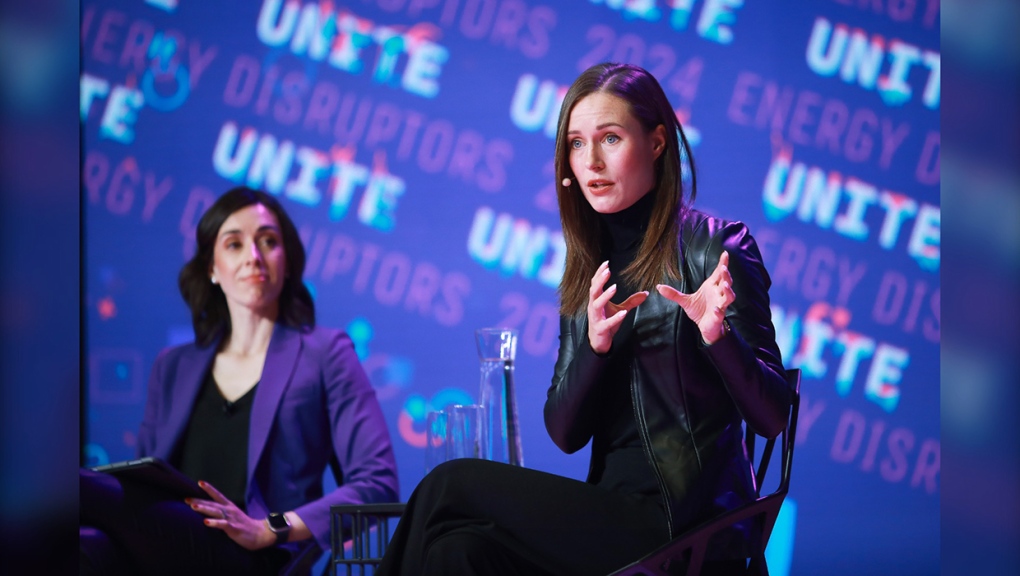Energy disruptor: Former University of Calgary professor David Keith talks about climate solutions as if the cost mattered
 David Keith, a professor of geophysical science at the University of Chicago, is a former University of Calgary professor who spoke about solar geoengineering at the Energy Disruptors Unite conference in Calgary in early October, 2024. (Photo: DavidKeith.earth)
David Keith, a professor of geophysical science at the University of Chicago, is a former University of Calgary professor who spoke about solar geoengineering at the Energy Disruptors Unite conference in Calgary in early October, 2024. (Photo: DavidKeith.earth)
Is geoengineering the environment ready for its closeup?
The New York Times thinks so, and a former University of Calgary professor is at the heart of a controversial conversation about how to cool down the planet.
That man, Canadian David Keith, who is a professor of geophysical science at the University of Chicago, was in Calgary last week speaking at Energy Disruptors Unite!, a conference that featured a blend of regulators, industry heavyweights, climate scientists, youthful environmental activists, journalists – and an astronaut.
Over 3,000 paid delegates crowded into the new BMO Centre on the Stampede Grounds to hear from a roster of energy innovators, including former Finnish prime minister Sanna Marin, former New Zealand PM Jacinda Arden, numerous sustainable energy CEOs, former astronaut Ron Garans, activist Nikki Sanchez, representatives from Pathways and other international energy companies – and Sapiens author Yuval Noah Harari, who appeared via hologram.
“Did anyone else notice that the title of this conference is ‘Disruptors Unite’?” Keith asked, after being introduced by former Pembina Institute CEO Ed Whittingham at a live taping of the Energy vs. Climate podcast.
“Is it just me,” he asked, “or is there something oxymoronic about that?”
'Least bad way'
In 2021, Keith published an opinion piece in the New York Times with the headline that asked a question: “What’s the Least Bad Way to Cool the Planet?”
 Host Holly Ransom and former Finnish Prime Minister Sanna Marin at the Energy Disruptors Unite! conference in Calgary in October, 2024. (Photo: Janeane Deanna)
Host Holly Ransom and former Finnish Prime Minister Sanna Marin at the Energy Disruptors Unite! conference in Calgary in October, 2024. (Photo: Janeane Deanna)
“To cool the planet in this century,” he wrote, “humans must either remove carbon from the air or use solar geoengineering, a temporary measure that may reduce peak temperatures, extreme storms and other climatic changes.”
That could happen, he explained, by “adding tiny sulfuric acid droplets to the stratosphere from aircraft, whitening low-level clouds over the ocean by spraying sea salt into the air or by other interventions.”
In the opinion piece, Keith makes the point that even if we were able to cut emissions to zero by 2050, the planet wouldn’t automatically cool down.
“Stopping emissions stops making the climate worse,” he wrote. “But repairing the damage, insofar as repair is possible, will require more than emissions cuts.”
In August, Keith was back in the Times, this time in a front-page feature by David Gelles with the headline, This Scientist has a Risky Plan to Cool Earth. There’s Growing Interest.
The Times story starts with an origin story about an act of accidental solar geoengineering: a 1991 volcano eruption in the Philippines that spewed 17 million tonnes of sulfur dioxide out of Mt. Pinatubo, that resulted in a drop in temperature of one degree Fahrenheit in the Northern Hemisphere that year.
'Cost is not the issue'
And while geoengineering might be the biggest of all the big ideas discussed at the Energy Disruptors Unite!, it’s also relatively inexpensive on an issue a lot of folks feel presents cost-of-living challenges.
In 1973, E.F. Schumacher wrote a book about foreign aid called Small is Beautiful: A study of economics as if people mattered.
Five decades later, Keith talks about approaching the climate crisis as if the cost of it mattered – which it plainly does.
“Cutting emissions will cost,” Keith said, in a post-podcast interview with CTV News. “I think what you are seeing in the U.S. elections and Canada and the rest of the world – I think there was this big initial wave of climate action (initiatives) and a lot of it was not very well considered.
“Our government in Canada said ‘yes’ to almost every seemingly sensible idea that came across their desk,” he said, “and now we’ve got a complicated grab bag of policies – I think broadly well-intentioned, I’m glad they’re interested in climate, but (cumulatively, they’re) not very economically efficient.
“What you’re going to see in the next decade,” he added, “is a shakeout where (the approach will be more like), ’no we’ve got climate action happening but money really matters.’”
“We can’t afford to spend money on everything,” he said, “and some climate actions are driving up consumer prices and some of that is inevitable – but some you could do better and smarter.”
 Volunteers at Energy Disruptors Unite! in Calgary, in October, 2024
Volunteers at Energy Disruptors Unite! in Calgary, in October, 2024
Consensus needed
Back at the podcast taping, Keith explains that what is needed to pursue an idea as potentially disruptive as solar geoengineering on any scale is a consensus – between countries, and even between hemispheres.
“The big lesson here is cost is not the issue,” Keith said. “Trust, and power are.”
He suggests that solar geoengineering is not something that ever could – or needs to – obtain a unanimous consensus to move forward, but if it were to originate from a rich country, “a stable coalition must include the global south.”
There is no consensus in climate science circles over geoengineering.
“The whole notion of spraying sulfur compounds to reflect sunlight is arrogant and simplistic,” David Suzuki said, in the Times article. “There are unintended consequences of powerful technologies like these, and we have no idea what they will be.”
Suzuki also authored a 2013 article with Ian Harington titled, “Is Geoengineering a Silver Bullet for climate change?” in which they said, “These methods don’t affect CO2 levels,” Suzuki and Harington wrote, “and so don’t address issues like ocean acidification, but they offer possible quick fixes to reduce warming.”
'Crossing a barrier'
In late 2022, a startup called Make Sunsets issued a release announcing that it was using weather balloons to release sulfur particles into the atmosphere, “potentially crossing a controversial barrier in the field of solar geoengineering,” said an article in the MIT Technology Review.
The startup, launched by Luke Iseman, was inspired by Termination Shock, a 2021 novel by American Neal Stephenson, about a billionaire who tries to fix the climate through solar geoengineering.
All of which begs a question.
Is there a law against doing this stuff?
“No. Not in a simple way,” Keith says. “We lack any overarching rule for governing the climate.
“To some extent, the framework for International Climate Change does some of that,” he adds, “but it does it on specific emission sources, it doesn’t do it for things that change the temperature other than emissions.
“So in some deep sense, there’s just a regulatory hole,” he says, “that we need to fix.”
Election issues
When I mention to Keith that climate change is not exactly topping the talking points of the 2024 U.S. presidential election, he says that may be a good thing.
“There’s a couple interpretations but the saddest answer would be like, climate activists have had their day and its done,” he says.
“But I think the happy answer is that there’s actually climate action happening,” he adds. “In fact, I wish there was more, but I’ve been working on climate since 1990, basically a third of a century and I used to give talks in this town (Calgary), saying oh it’s a phony war, politicians come talking about climate, but if you came from Mars, went around and looked at half the world under carbonization, they’d say, nothing is happening.
“That’s not true anymore," he says.
“I mean, we could be doing more, but we really are doing stuff,” he says.
“You don’t see Trump consistently saying he’d rip up all the climate policies,” he adds. “I mean, you can find him saying almost anything – but I don’t get a sense that if he wins, they would remove everything. And I don’t see that a Harris administration would do a lot more – and I find a lot of that comforting in a way.
“Maybe climate action is almost stable.”
Keith may have departed the University of Calgary over a decade ago, but he still has Alberta in his bones, particularly Canmore, where he still spends a chunk of his time.
“That’s definitely a long-term home for sure,” he says. “I’m definitely excited about this University of Chicago job and I commute back and forth, and for the next number of years, I’ll be there about half the time, no question – Canmore’s home.”
CTVNews.ca Top Stories

opinion Tom Mulcair: Prime Minister Justin Trudeau's train wreck of a final act
In his latest column for CTVNews.ca, former NDP leader and political analyst Tom Mulcair puts a spotlight on the 'spectacular failure' of Prime Minister Justin Trudeau's final act on the political stage.
B.C. mayor gets calls from across Canada about 'crazy' plan to recruit doctors
A British Columbia community's "out-of-the-box" plan to ease its family doctor shortage by hiring physicians as city employees is sparking interest from across Canada, says Colwood Mayor Doug Kobayashi.
'There’s no support': Domestic abuse survivor shares difficulties leaving her relationship
An Edmonton woman who tried to flee an abusive relationship ended up back where she started in part due to a lack of shelter space.
opinion King Charles' Christmas: Who's in and who's out this year?
Christmas 2024 is set to be a Christmas like no other for the Royal Family, says royal commentator Afua Hagan. King Charles III has initiated the most important and significant transformation of royal Christmas celebrations in decades.
Baseball Hall of Famer Rickey Henderson dead at 65, reports say
Rickey Henderson, a Baseball Hall of Famer and Major League Baseball’s all-time stolen bases leader, is dead at 65, according to multiple reports.
Arizona third-grader saves choking friend
An Arizona third-grader is being recognized by his local fire department after saving a friend from choking.
Germans mourn the 5 killed and 200 injured in the apparent attack on a Christmas market
Germans on Saturday mourned the victims of an apparent attack in which authorities say a doctor drove into a busy outdoor Christmas market, killing five people, injuring 200 others and shaking the public’s sense of security at what would otherwise be a time of joy.
Blake Lively accuses 'It Ends With Us' director Justin Baldoni of harassment and smear campaign
Blake Lively has accused her 'It Ends With Us' director and co-star Justin Baldoni of sexual harassment on the set of the movie and a subsequent effort to “destroy' her reputation in a legal complaint.
Oysters distributed in B.C., Alberta, Ontario recalled for norovirus contamination
The Canadian Food Inspection Agency has issued a recall due to possible norovirus contamination of certain oysters distributed in British Columbia, Alberta and Ontario.

































